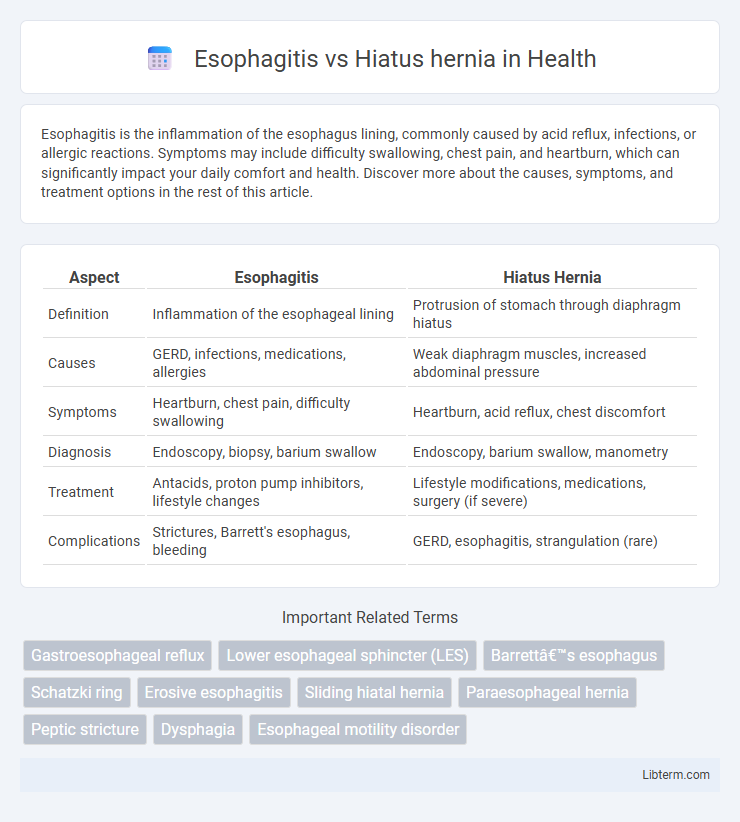Esophagitis is the inflammation of the esophagus lining, commonly caused by acid reflux, infections, or allergic reactions. Symptoms may include difficulty swallowing, chest pain, and heartburn, which can significantly impact your daily comfort and health. Discover more about the causes, symptoms, and treatment options in the rest of this article.
Table of Comparison
| Aspect | Esophagitis | Hiatus Hernia |
|---|---|---|
| Definition | Inflammation of the esophageal lining | Protrusion of stomach through diaphragm hiatus |
| Causes | GERD, infections, medications, allergies | Weak diaphragm muscles, increased abdominal pressure |
| Symptoms | Heartburn, chest pain, difficulty swallowing | Heartburn, acid reflux, chest discomfort |
| Diagnosis | Endoscopy, biopsy, barium swallow | Endoscopy, barium swallow, manometry |
| Treatment | Antacids, proton pump inhibitors, lifestyle changes | Lifestyle modifications, medications, surgery (if severe) |
| Complications | Strictures, Barrett's esophagus, bleeding | GERD, esophagitis, strangulation (rare) |
Introduction to Esophagitis and Hiatus Hernia
Esophagitis is the inflammation of the esophageal lining caused by acid reflux, infections, or irritants, leading to symptoms like heartburn and difficulty swallowing. Hiatus hernia occurs when part of the stomach pushes through the diaphragm into the chest cavity, often contributing to gastroesophageal reflux disease (GERD) and exacerbating esophagitis. Both conditions disrupt normal esophageal function and require targeted management to prevent complications such as esophageal ulcers or bleeding.
Key Differences Between Esophagitis and Hiatus Hernia
Esophagitis involves inflammation of the esophageal lining, commonly caused by acid reflux, infections, or allergens, presenting symptoms like heartburn, pain, and difficulty swallowing. Hiatus hernia occurs when part of the stomach pushes through the diaphragm into the chest cavity, often leading to gastroesophageal reflux disease (GERD) symptoms such as acid reflux and chest discomfort but not necessarily inflammation. Unlike hiatus hernia, which is an anatomical abnormality diagnosed via imaging or endoscopy, esophagitis is primarily a mucosal condition confirmed through esophageal biopsy or endoscopic appearance.
Causes and Risk Factors
Esophagitis is primarily caused by acid reflux, infections, or allergens damaging the esophageal lining, with risk factors including GERD, smoking, and medication use. Hiatus hernia occurs when part of the stomach pushes through the diaphragm into the chest cavity, often linked to aging, obesity, and increased abdominal pressure from coughing or heavy lifting. Both conditions share risk factors like obesity and GERD but differ in their underlying anatomical and inflammatory causes.
Common Symptoms and Clinical Presentation
Esophagitis commonly presents with symptoms such as heartburn, chest pain, dysphagia, and acid regurgitation due to inflammation of the esophageal lining. Hiatus hernia often manifests with similar symptoms, including gastroesophageal reflux, chest discomfort, and occasional difficulty swallowing, caused by the protrusion of the stomach through the diaphragm. Both conditions may produce overlapping clinical presentations like chronic cough and hoarseness, making endoscopic evaluation essential for accurate diagnosis.
Diagnostic Approaches
Diagnostic approaches for esophagitis primarily involve upper endoscopy with biopsy to assess mucosal inflammation and identify underlying causes such as infection or acid reflux. Hiatus hernia diagnosis often relies on barium swallow radiography or high-resolution esophageal manometry to detect anatomical displacement of the stomach through the diaphragm and evaluate esophageal motility. pH monitoring may be used adjunctively in both conditions to measure acid exposure and correlate symptoms with reflux events.
Treatment Options for Esophagitis
Treatment options for esophagitis primarily include proton pump inhibitors (PPIs) such as omeprazole and esomeprazole, which reduce stomach acid production and promote mucosal healing. Lifestyle modifications, including dietary changes to avoid spicy foods, alcohol, and smoking cessation, can significantly alleviate symptoms. In severe cases, corticosteroids or antifungal medications may be prescribed depending on the underlying cause, with endoscopic intervention reserved for complications like strictures.
Management Strategies for Hiatus Hernia
Management strategies for hiatus hernia primarily focus on lifestyle modifications such as weight loss, dietary adjustments to avoid trigger foods, and elevating the head of the bed to reduce acid reflux. Pharmacologic treatments include proton pump inhibitors (PPIs) or H2 receptor antagonists to control gastroesophageal reflux symptoms and prevent esophageal damage. In severe cases, surgical interventions like laparoscopic fundoplication or hernia repair may be necessary to restore the normal anatomy and prevent complications.
Potential Complications
Esophagitis can lead to complications such as esophageal strictures, Barrett's esophagus, and increased risk of esophageal cancer due to chronic inflammation. Hiatus hernia may cause complications including gastroesophageal reflux disease (GERD), esophagitis, and in severe cases, strangulation or obstruction of the herniated stomach portion. Both conditions increase the risk of esophageal damage, but hiatus hernia specifically contributes to mechanical disruption of the gastroesophageal junction, exacerbating reflux-related complications.
Lifestyle Modifications and Prevention
Lifestyle modifications for esophagitis and hiatus hernia emphasize weight management, avoiding large meals, and reducing intake of acidic or spicy foods to prevent acid reflux and inflammation. Elevating the head of the bed by 6 to 8 inches and avoiding lying down within three hours after eating can decrease nighttime symptoms and esophageal irritation. Smoking cessation and limiting alcohol consumption are critical preventive measures to reduce the risk of mucosal damage and hernia exacerbation.
When to Seek Medical Attention
Seek medical attention for esophagitis when experiencing severe or persistent symptoms such as painful swallowing, chest pain, or significant acid reflux unresponsive to over-the-counter treatments. For hiatus hernia, urgent medical care is necessary if there is intense chest pain, difficulty swallowing, vomiting blood, or signs of obstruction. Early diagnosis and treatment by a gastroenterologist can prevent complications like esophageal strictures or strangulation of the hernia.
Esophagitis Infographic

 libterm.com
libterm.com